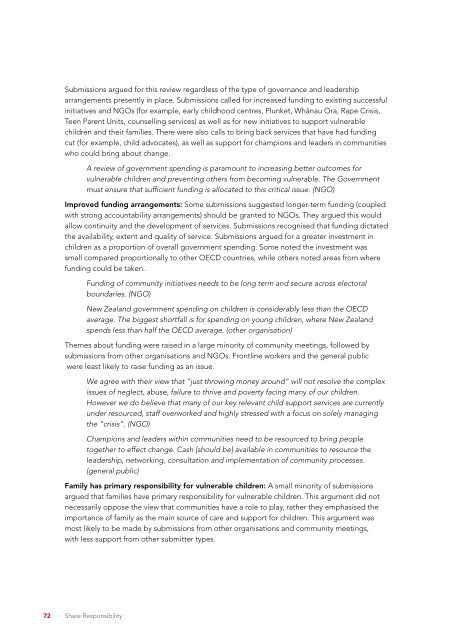The Green Paper for Vulnerable Children - Ministry of Social ...
The Green Paper for Vulnerable Children - Ministry of Social ...
The Green Paper for Vulnerable Children - Ministry of Social ...
Create successful ePaper yourself
Turn your PDF publications into a flip-book with our unique Google optimized e-Paper software.
Submissions argued <strong>for</strong> this review regardless <strong>of</strong> the type <strong>of</strong> governance and leadershiparrangements presently in place. Submissions called <strong>for</strong> increased funding to existing successfulinitiatives and NGOs (<strong>for</strong> example, early childhood centres, Plunket, Whānau Ora, Rape Crisis,Teen Parent Units, counselling services) as well as <strong>for</strong> new initiatives to support vulnerablechildren and their families. <strong>The</strong>re were also calls to bring back services that have had fundingcut (<strong>for</strong> example, child advocates), as well as support <strong>for</strong> champions and leaders in communitieswho could bring about change.A review <strong>of</strong> government spending is paramount to increasing better outcomes <strong>for</strong>vulnerable children and preventing others from becoming vulnerable. <strong>The</strong> Governmentmust ensure that sufficient funding is allocated to this critical issue. (NGO)Improved funding arrangements: Some submissions suggested longer-term funding (coupledwith strong accountability arrangements) should be granted to NGOs. <strong>The</strong>y argued this wouldallow continuity and the development <strong>of</strong> services. Submissions recognised that funding dictatedthe availability, extent and quality <strong>of</strong> service. Submissions argued <strong>for</strong> a greater investment inchildren as a proportion <strong>of</strong> overall government spending. Some noted the investment wassmall compared proportionally to other OECD countries, while others noted areas from wherefunding could be taken.Funding <strong>of</strong> community initiatives needs to be long term and secure across electoralboundaries. (NGO)New Zealand government spending on children is considerably less than the OECDaverage. <strong>The</strong> biggest shortfall is <strong>for</strong> spending on young children, where New Zealandspends less than half the OECD average. (other organisation)<strong>The</strong>mes about funding were raised in a large minority <strong>of</strong> community meetings, followed bysubmissions from other organisations and NGOs. Frontline workers and the general publicwere least likely to raise funding as an issue.We agree with their view that “just throwing money around” will not resolve the complexissues <strong>of</strong> neglect, abuse, failure to thrive and poverty facing many <strong>of</strong> our children.However we do believe that many <strong>of</strong> our key relevant child support services are currentlyunder resourced, staff overworked and highly stressed with a focus on solely managingthe “crisis”. (NGO)Champions and leaders within communities need to be resourced to bring peopletogether to effect change. Cash [should be] available in communities to resource theleadership, networking, consultation and implementation <strong>of</strong> community processes.(general public)Family has primary responsibility <strong>for</strong> vulnerable children: A small minority <strong>of</strong> submissionsargued that families have primary responsibility <strong>for</strong> vulnerable children. This argument did notnecessarily oppose the view that communities have a role to play, rather they emphasised theimportance <strong>of</strong> family as the main source <strong>of</strong> care and support <strong>for</strong> children. This argument wasmost likely to be made by submissions from other organisations and community meetings,with less support from other submitter types.72 Share Responsibility
















